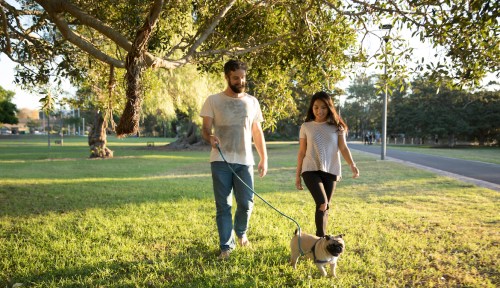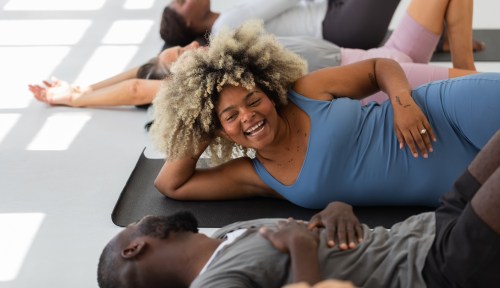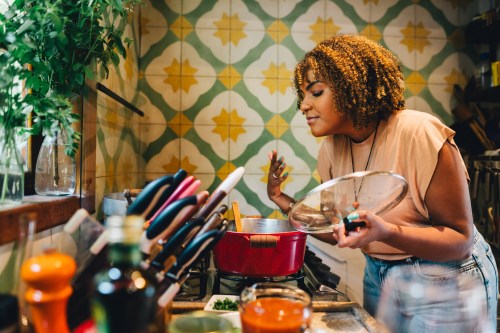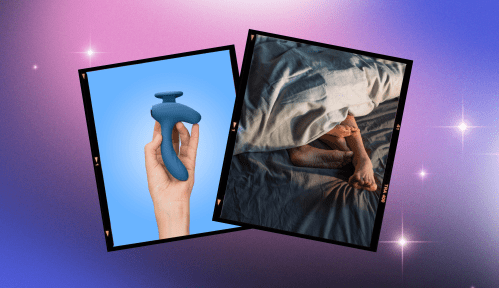It started toward the beginning of the pandemic, when the world was on lockdown. Taking our dog Zoey for a walk outside was one of the few reprieves my husband and I found from the closing-in walls. While her daytime bathroom breaks were more or less an act of necessity, we quickly turned Zoey’s evening walks into something of a family adventure. (Hey, there were few thrills in those times.)
Experts in This Article
clinical psychology researcher and co-founder and chief well-being officer at creative-health platform Daydreamers
Shortly after closing our laptops, we’d head out the door for up to 45 minutes, just strolling the neighborhood, finding neat homes or green spaces we somehow hadn’t noticed in the 12 years we’ve lived in the area. We took in our town with a kind of stillness and observation that we just weren’t able to pre-pandemic.
As the months, and then years, of the COVID-era rolled on, and WFH stuck around permanently for him, then part-time for me, the one thing that remained a constant were these long walks we’d take every evening as a family of three. (Yes, dogs are 100 percent family.) Even when I had to go into the office, we continued the habit, with him and Zoey meeting me after I got off the bus. Those days were even sweeter because it was a true decompression time post-commute.
It was subconscious at first, simply finding solace in the routine of it all, but with time, we began to realize the consistency of this half-hour or so spent together, phones tucked away and work set aside, allowed us to connect in a more mindful way.
Some days that meant simply relaxing after long hours on Zoom, laughing at Zoey’s antics, walking mostly in relative silence. Often, this time allowed us to check in with each other in a more measured way. Asking not just how our days were, but how we felt about an interaction, and honestly, what we hoped for our future, whether that was merely weekend plans, or something more existential. We’ve been dancing around the kids convo for a while, and while it’s still super tricky to navigate, talking about it while we’re walking has felt like a nice way to ease into scary territory.
“In an incessantly distracted and always-on world it can seem that you’re always ‘together’ but never truly there, especially when it comes to our intimate relationships,” says Katina Bajaj, co-founder and chief well-being officer of Daydreamers and a clinical psychologist with a masters degree from Columbia University’s Spirituality Mind Body Institute. “There are so many subtle cues that you send each other when you’re connecting in person, without distractions, that you miss when you don’t prioritize it.”
As my husband and I became more aware of how nice it was to have this time to be more present for each other, and how it seemed to move complex or difficult conversations forward, we made the interactions more intentional. We set aside one day a week where we’d specifically use our walk to “check in”—ask a probing question, talk about a topic on our minds, or clear the air about something that we felt was lingering. For instance, my husband had been feeling a little restless at work, while at the same time, my own career was taking more and more of my attention.
“Doing something enjoyable together, like walking your dog or creating a new recipe, increases your collective dopamine,” explains Bajaj. “Also, during a creative flow state, the part of your brain responsible for internal mental chatter begins to quiet down, leaving space for vulnerability and a reduction in self-consciousness—all important elements to building stronger, deeper connections.”
And I saw this work IRL for us, as the casual nature of a walk with the dog allowed for the right amount of mindfulness without feeling interrogative or combative, especially when a certain topic felt tricker to navigate. Plus, by the time we got home, we generally felt lighter emotionally, really ready to relax for dinner and couch time where we could comfortably zen out and totally unplug.
I don’t think either of us would have predicted a simple walk with our pup would have turned into something that mattered so much to us both, but we’re holding steady on our commitment to create space for each other and for Zoey—no matter what that looks like, it’s time well-spent together. I can honestly say, we still do everything in our power to stay committed to this time. We only skip our evening walk when we truly can’t move something to accommodate it.
For Bajaj, she says she’s not so surprised by the subtle yet positive effects. “Most [human] connection is happening subconsciously,” she says, “so being near each other, doing things you enjoy, is much more powerful than you think.”
Sign Up for Our Daily Newsletter
Get all the latest in wellness, trends, food, fitness, beauty, and more delivered right to your inbox.
Got it, you've been added to our email list.











